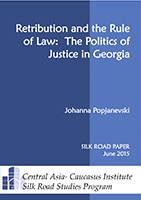 Executive Summary
Executive Summary
Over the last several years a gradual politicization of justice in Georgia has put into question the country’s democratization progress. Most attention has centered on the judicial campaign launched beginning in late 2012 against a number of former government officials, including former President Mikheil Saakashvili, who has been ordered to pre-trial detention in absentia. This policy of selective justice has resulted in domestic as well as international criticism and raises important questions with regard to the independence of the judicial structures and, overall, the current state of the rule of law in Georgia.
This paper highlights that the lack of judicial independence is a long-standing problem in Georgia, dating back to Soviet times. While the post-revolutionary government that came to power in 2004 in Georgia undertook a number of measures to restore the judicial structures, including constitutional amendments aimed at strengthening the independence of the judiciary and a new Criminal Procedure Code deemed largely in line with international standards, many of the traditional problems of the judiciary persisted. Judges continued to systematically rule in favor of the prosecution, and public trust in the judiciary remained alarmingly low. Property rights violations were frequent and often neglected by the prosecution, and appeared to accelerate in the last years of the Saakashvili administration. Poor prison conditions also remained an issue of strong international concern.
Since the democratic transfer of power in 2012, Georgia continues to grapple with these long-standing issues relating to the state of the judiciary. In addition, the judiciary increasingly appears to be used as a tool for political retribution. The ruling Georgian Dream (GD) coalition, which came to power largely based on a common agenda of ousting President Saakashvili and his team from power, has had notable difficulties in uniting in reform efforts in other spheres and delivering on its promises of improved socio-economic conditions for the Georgian public. Similarly, it has struggled to attract foreign investments. Instead, the government has focused on bringing justice to past deeds.
The Prosecutor’s Office has launched a judicial campaign against a number of former government officials, including the former minister of internal affairs, Bacho Akhalaia, the former prime minister, Vano Merabishvili, the former Mayor of Tbilisi, Gigi Ugulava, and, most recently, former President Mikheil Saakashvili.
Along with former high-level officials, the prosecution has targeted thousands of individuals, many of them opposition activists, and subjected them to questioning or investigation. The campaign, notably, has also targeted political rivals within the GD coalition itself. In May 2013, a number of officials from the Ministry of Agriculture were arrested on embezzlement charges, in an apparent attempt to discredit then-Minister Davit Kirvalidze and remove him from office. The events resulted in Kirvalidze’s resignation; however, months later the charges against his team were dropped due to a lack of evidence. Similarly, in October 2014 high-ranking officials within the Ministry of Defense were arrested on charges of budgetary misspending, resulting in the dismissal of the defense minister, Irakli Alasania, from office. Alasania had established himself as the most popular politician in Georgia; the deepening rift between him and the Georgian Dream leadership was well known, and it was widely expected that his party would run separately in the 2016 elections.
This paper examines the question of the politicization of justice in light of two key issues: first, the degree to which the prosecution is under the influence of the executive; and second, whether the arrests are purely punitive, or seek to weaken political opponents. The study finds that several factors suggest that the prosecution lacks independence from the executive. The prime minister’s exclusive control over the appointment and dismissal of the prosecutor general testify to the potential control exercised by the elite over the prosecution. While the independence of judges has reportedly improved somewhat in recent years, for example through the introduction of lifetime appointments for judges, they may still be dismissed within a three-year probation period.
Concerning the motives behind the arrests, the current practices differ markedly from the Saakashvili era. After coming to power, Saakashvili’s team, too, launched a campaign against members of the previous elite who were accused of corruption. High-level officials were arrested in public, and in many cases the individuals were never charged but released in exchange for compensation for financial damage to the state. However, the political context to the events in 2004 and the present-day situation are different. A decade ago, the former authorities were not an opposition force capable of challenging the new government. The post-revolutionary campaign was therefore mainly punitive, and did not serve to weaken or eliminate the opposition. Moreover, when a new opposition emerged in the years following the revolution, breaking off from Saakashvili’s team, they were not directly targeted by the prosecution. Thus, the judiciary appears presently to be used for political purposes to a larger extent than before. The timing of some of the recent arrests is a further indication of their political nature. At the time of Merabishvili’s arrest, the former prime minister was widely expected to be the UNM candidate in the 2013 presidential election. Ugulava, who served as UNM’s campaign manager, was arrested shortly before the second round of local elections in July 2015, with damaging consequences for UNM’s election campaign. The arrest of the five Ministry of Defense officers in October 2014 took place while Alasania was in France to sign an agreement on a new air defense system. While the decision to conclude the agreement was anchored at the highest political level, Alasania reportedly received a last-minute phone call from Tbilisi with orders not to sign—suggesting that the arrests of his staff, and his subsequent dismissal, were politically motivated.
The emerging practice of selective and political justice in Georgia should be of concern to domestic and Western policymakers for several reasons. First, a continuously polarized political scene is damaging to Georgian interests as it hampers cooperation in fields where the government and opposition have common objectives. Political instability not only delays reform work, but also makes the country vulnerable to various threats. Domestically, it risks leading to national unrest, and even external manipulation. In light of the continuous threat that Georgia is exposed to, it is more crucial than ever that Georgia’s political forces unite to address issues relating to national security. This is particularly relevant given Russia’s actions in Ukraine, and its recent policy of concluding partnership agreements with the separatist authorities in Abkhazia and South Ossetia, which amounts to further annexation of the two regions. Finally, it is damaging to the country’s Euro-Atlantic integration processes. Both the U.S. and the EU have repeatedly warned against actions amounting to political retribution, but the judicial campaign against political rivals of the government has continued apace. If the judiciary continues to be exploited for political purposes, it will therefore impede Georgia’s democratization process, its stability and Euro-Atlantic integration, and ultimately its national security.

 By
By